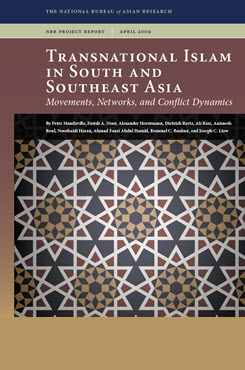From Transnational Islam in South and Southeast Asia: Movements, Networks, and Conflict Dynamics
Interactions of "Transnational" and "Local" Islam in Bangladesh
This paper examines the historical trajectory and current status of key transnational Islamic organizations, conduits and trends in Bangladesh to assess their impact on the socio-political and conflict dynamics of the country. The paper argues that Bangladesh’s socio-political dynamics and a weak Bangladeshi state have fostered the proliferation of Islamic organizations and Islamist parties with transnational ties.
EXECUTIVE SUMMARY
This paper examines the historical trajectory and current status of key transnational Islamic organizations, conduits and trends in Bangladesh to assess their impact on the socio-political and conflict dynamics of the country. The paper argues that Bangladesh’s socio-political dynamics and a weak Bangladeshi state have fostered the proliferation of Islamic organizations and Islamist parties with transnational ties. Transnational Islamist currents have also given rise to militant organizations in Bangladesh over the past decade. The paper argues that Bangladesh will continue to witness tensions between transnational interpretations of Islam and local practices in the future, and argues for a more historically grounded and nuanced strategy to help the country oppose its militant elements while strengthening its pietist, tolerant and secularist currents.
MAIN FINDINGS
Transnational Islamic and Islamist organizations, both pietist and political, have a considerable presence in Bangladesh. In recent years, the transnational Islamist organizations have grown significantly. Bangladesh’s domestic political environment over the past two decades allowed the Islamists to consolidate their position; consequently, it opened the space for transnational Islamist groups to operate with state support. If the situation remains unchanged, the space for Islamist activities will widen further. Some of these Islamist groups espouse violence, posing a threat to the country’s security. The presence of transnational militant groups in Bangladesh has also increased sectarianism within the country. Some of these organizations are extending their operations to neighboring India. Local traditional Islamic practices in Bangladesh are undergoing changes due to interactions with the outside world mediated by transnational Islamic groups, the Bangladeshi diaspora community and the global media. The increased religiosity among the Bangladeshi population, palpable changes in dress, social behavior, and increased sensitivity towards religious issues are indicative of the ongoing changes. Bangladesh is likely to continue to witness tensions between local traditional Islamic practices and those promoted by transnational groups, which will have social and political implications alike.
POLICY IMPLICATIONS
- While it is necessary to remain cognizant of the Islamists’ presence in Bangladesh’s political arena, the policies of Western nations should not undermine the secularist forces representing the majority of the Bangladeshi population.
- Transnational Islamist thought and organizations are impacting upon both the social and political arenas of Bangladesh; therefore, policies should be cognizant of these twin aspects in order to be comprehensive in nature.
- The local traditional Islamic traits which encourage pietist practices and the separation of faith and politics in Bangladesh should be highlighted and strengthened.
- Emphasis should be given to the enhancement of the Bangladeshi state’s capacity for cultivating political goodwill to deal with transnational Islamist political networks which pose a threat to the country’s security.


